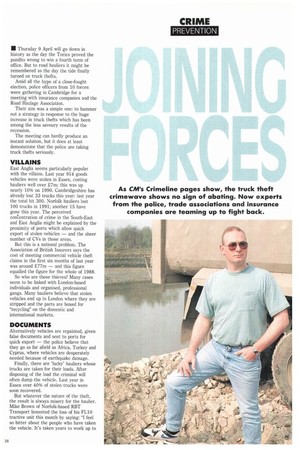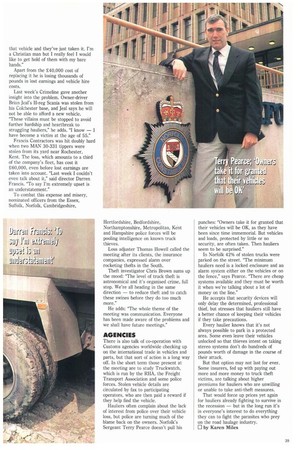As CM's Crimeline pages show, the truck theft crimewave shows
Page 40

Page 41

If you've noticed an error in this article please click here to report it so we can fix it.
no sign of abating. Now experts from the police, trade associations and insurance companies are teaming up to fight back.
• Thursday 9 April will go down in history as the day the Tories proved the pundits wrong to win a fourth term of office. But to road hauliers it might be remembered as the day the tide finally turned on truck thefts.
Amid all the hype of a close-fought election, police officers from 10 forces were gathering in Cambridge for a meeting with insurance companies and the Road Haulage Association.
Their aim was a simple one: to hammer out a strategy in response to the huge increase in truck thefts which has been among the less savoury results of the recession.
The meeting can hardly produce an instant solution, but it does at least demonstrate that the police are taking truck thefts seriously.
VILLAINS
East Anglia seems particularly popular with the villains. Last year 914 goods vehicles were stolen in Essex, costing hauliers well over £7m; this was up nearly 10% on 1990. Cambridgeshire has already lost 33 trucks this year: last year the total hit 300. Norfolk hauliers lost 100 trucks in 1991; another 15 have gone this year. The perceived
A
concentration of crime in the South-East and East Anglia might be explained by the proximity of ports which allow quick export of stolen vehicles — and the sheer number of CVs in those areas.
But this is a national problem. The Association of British Insurers says the cost of meeting commercial vehicle theft claims in the first six months of last year was around £77m — and this figure equalled the figure for the whole of 1988.
So who are these thieves? Many cases seem to be linked with London-based individuals and organised, professional gangs. Many hauliers believe that stolen vehicles end up in London where they are stripped and the parts are boxed for "recycling" on the domestic and international markets.
DOCUMENTS
Alternatively vehicles are repainted, given false documents and sent to ports for quick export — the police believe that they go as far afield as Africa, Turkey and Cyprus, where vehicles are desperately needed because of earthquake damage.
Finally, there are 'lucky' hauliers whose trucks are taken for their loads. After disposing of the load the criminal will often dump the vehicle. Last year in Essex over 40% of stolen trucks were soon recovered.
But whatever the nature of the theft, the result is always misery for the haulier. Mike Brown of Norfolk-based RBT Transport lamented the loss of his FL10 tractive unit this month by saying: 1 feel so bitter about the people who have taken the vehicle. It's taken years to work up to
that vehicle and they've just taken it. I'm a Christian man but I really feel I would like to get hold of them with my bare hands."
Apart from the £40,000 cost of replacing it he is losing thousands of pounds in lost earnings and vehicle hire costs.
Last week's Crimeline gave another insight into the problem. Owner-driver Brian Jeal's H-reg Scania was stolen from his Colchester base, and Jeal says he will not be able to afford a new vehicle. "These villains must be stopped to avoid further hardship and heartbreak to struggling hauliers," he adds. "I know — I have become a victim at the age of 55."
Francis Contractors was hit doubly hard when two MAN 30-331 tippers were stolen from its yard near Rochester, Kent. The loss, which amounts to a third of the company's fleet, has cost it .60,000, even before lost earnings are taken into account. "Last week I couldn't even talk about it," said director Darren Francis. "To say I'm extremely upset is an understatement."
To combat this expense and misery, nominated officers from the Essex, Suffolk, Norfolk, Cambridgeshire, Hertfordshire, Bedfordshire, Northamptonshire, Metropolitan, Kent and Hampshire police forces will be pooling intelligence on known truck thieves.
Loss adjuster Thomas Howell called the meeting after its clients, the insurance companies, expressed alarm over rocketing thefts in the South.
Theft investigator Chris Brown sums up the mood: "The level of truck theft is astronomical and its organised crime, full stop. We're all heading in the same direction — to reduce theft and to catch these swines before they do too much more."
He adds: "The whole theme of the meeting was communication. Everyone has been made aware of the problems and we shall have future meetings."
AGENCIES
There is also talk of co-operation with Customs agencies worldwide checking up on the international trade in vehicles and parts, but that sort of action is a long way off. In the short term those present at the meeting are to study Truckwatch, which is run by the RHA, the Freight Transport Association and some police forces. Stolen vehicle details are circulated by fax to participating operators, who are then paid a reward if they help find the vehicle.
Hauliers often complain about the lack of interest from police over their vehicle loss, but police are turning much of the blame back on the owners. Norfolk's Sergeant Terry Pearce doesn't pull his punches: "Owners take it for granted that their vehicles will be OK, as they have been since time immemorial. But vehicles and loads, protected by little or no security, are often taken. Then hauliers seem to be surprised."
In Norfolk 42% of stolen trucks were parked on the street. "The minimum hauliers need is a locked enclosure and an alarm system either on the vehicles or on the fence," says Pearce. "There are cheap systems available and they must be worth it when we're talking about a lot of money on the line."
He accepts that security devices will only delay the determined, professional thief, but stresses that hauliers still have a better chance of keeping their vehicles if they take precautions.
Every haulier knows that it's not always possible to park in a protected area. Some even leave their vehicles unlocked so that thieves intent on taking stereo systems don't do hundreds of pounds worth of damage in the course of their attack.
But that option may not last for ever. Some insurers, fed up with paying out more and more money to truck theft victims, are talking about higher premiums for hauliers who are unwilling or unable to take anti-theft measures.
That would force up prices yet again for hauliers already fighting to survive in the recession — but in the long run it's in everyone's interest to do everything they can to fight the parasites who prey on the road haulage industry.
by Karen Miles
















































































